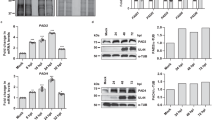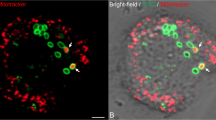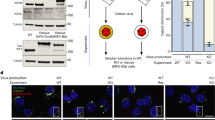Abstract
ARGININE deprivation of herpes simplex virus infected cells resulted in (a) inhibition of the synthesis of infectious virions1–5; (b) a decline in the rate of cellular protein synthesis3; (c) a continuous replication of viral DNA3; (d) synthesis of virus specific proteins6; and (e) synthesis of virus specific antigens (ref. 7 and personal communication of A. B. Sabin). Addition of arginine to the deprived cells resulted in the restoration of virus replication and the envelopment of the viral DNA3. Recently, the analyses of enveloped herpes virions8,9 by acrylamide gel electrophoresis10 demonstrated that the herpes virion is composed of seven major structural viral proteins (designated II to VIII10). Two of these proteins (designated II and VIII) constitute the viral capsid; two proteins constitute the viral core proteins (VII and VI); and three glycoproteins (designated III, IV, V) are present in the viral envelopes. Protein III is found in the large outer envelope of the cytoplasmic herpes simplex virions10. Protein I seems to be an aggregate of one of the envelope proteins and protein IX constitutes only 1 per cent of the structural proteins10. It was therefore possible to identify the virus specific structural proteins synthesized in the infected cells in the absence of arginine and used for virion formation on the addition of arginine.
This is a preview of subscription content, access via your institution
Access options
Subscribe to this journal
Receive 51 print issues and online access
$199.00 per year
only $3.90 per issue
Buy this article
- Purchase on Springer Link
- Instant access to full article PDF
Prices may be subject to local taxes which are calculated during checkout
Similar content being viewed by others
References
Tankersley, R. W., J. Bacteriol., 87, 609 (1964).
Sharon, N., Proc. Ninth Microbiol. Congress, 508 (1966).
Becker, Y., Olshevsky, U., and Levitt, J., J. Gen. Virol., 1, 471 (1967).
Gonczol, E., Jeney, F., and Vaczi, L., Acta Microbiol. Acad. Sci. Hung., 14, 31 (1967).
Inglis, V. B. M., J. Gen. Virol, 3, 9 (1968).
Spring, S. B., Roizman, B., and Spear, P. G., Virology, 38, 710 (1969).
Courtney, R. J., and McCombs, R. M., Bact. Proc., 69, 167 (1969).
Aurelian, L., and Wagner, R. R., Proc. US Nat. Acad. Sci., 56, 902 (1966).
Becker, Y., Olshevsky, U., and Levitt-Hadar, J. (in the press).
Olshevsky, U., and Becker, Y., Virology (in the press).
Hochberg, E., and Becker, Y., J. Gen. Virol., 2, 231 (1969).
Eagle, H., Science, 130, 432 (1959).
Maizel, J. V., Science, 151, 988 (1966).
Russell, W. C., and Becker, Y., Virology, 35, 18 (1968).
Author information
Authors and Affiliations
Rights and permissions
About this article
Cite this article
OLSHEVSKY, U., BECKER, Y. Synthesis of Herpes Simplex Virus Structural Proteins in Arginine Deprived Cells. Nature 226, 851–853 (1970). https://doi.org/10.1038/226851a0
Received:
Issue Date:
DOI: https://doi.org/10.1038/226851a0
This article is cited by
-
Restriction of herpes simplex virus by ama 1 cells. An analysis of viral macromolecule synthesis
Archives of Virology (1980)
-
The significance of the arginine and arginase of tears in experimentally-induced herpes simplex corneae
Albrecht von Graefes Archiv f�r Klinische und Experimentelle Ophthalmologie (1979)
Comments
By submitting a comment you agree to abide by our Terms and Community Guidelines. If you find something abusive or that does not comply with our terms or guidelines please flag it as inappropriate.



